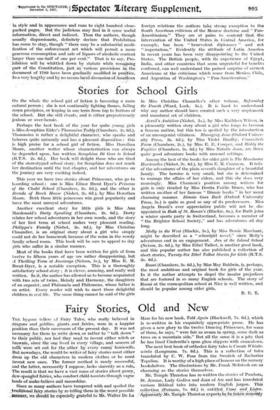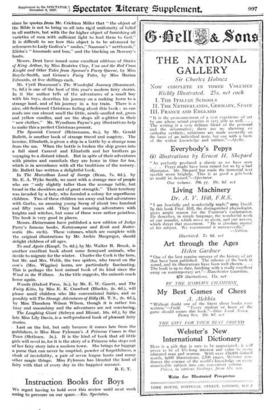Fairy Stories, Old and New ThE bygone tellers Gf Fairy
Tales-, who really believed in dragons and rroblins, aiants and fairies, were in a happier position than their successors of the present day. It was not necessary for .them to write down,_ or rather to " talk down " to their p&p, _nor had they negsi to invent either witch or brownie, since the one lived in 'every village, and saucers of mill wereset out for the other , bx every canny hbitSewife. But nowadays, the would-be writer of fairy stories must either dreSS up the old characters in modern clothes or he must invent new ones. The former method is rarely successful, and the latter, necessarily I suppose, lacks sincerity as a rule. The result is that we have a vast mass of stories about gauzy, dew-spangled fairies, who conduct child-tourists through vague lands of make-believe and moonshine.
Since so many authors have tampered with and spoiled the irtM14ionalfaily,,storieshy re-telling them in th_e:worst pos_sible ...11410b should tie .especially grateful to Mr. Walter Dc La
Mare for his new book, Told Again (Blackwell, 7s. 6d.), which is re-written in his exquisitely appropriate prose. He has given a new glory to the twelve Dancing Princesses, for some of them, he says, " were fair as swans in spring, some dark as trees on a mountain side." But all the same it is a pity that he has lined Cinderella's spun glass slipPers'with swansdown.
The next best book of orthodox fairy tales is Canute Whistle- winks (Longman. 7s. 6d.). This is a -collection of tales translated by C. W. Foss from the Swedish of Zacharias Topelius. It is worthy of a high place of honour on the nursery bookshelves. The illustrations by. Mr. Frank McIntosh arc as charming as the stories themselves.
Mr. Temple Thurston has re-written the stories of Pandora, St. Jerome, Lady Godiva and Joan of Arc and has translated
various Biblical tales into modem English jargon. This . collection (Putnam, 7s. 6d.) is entitled Come and...Listen . 2--Apparently Mr. Temple Thurston-expects to_be taken SerlAkly
since he quotes.from Mr. Crichton Miller that " the object of the Bible is not to bring us all into rigid uniformity of belief in all matters, but with the far higher object of furnishing all varieties of men_with sufficient light to lead. them to God." It is difficult to see how this object is to be advanced by references to Lady Godiva's " undies," Naaman's nettlerash," Elisha's " lemonade and bun," and the blacking on Mercury's boots.
Messrs. Dent have issued some excellent editions of Stories of King Arthur, by Miss Beatrice Clay, Una and the Red Cross Knight and Other Tales from Spenser's Faery Queene, by Miss Royde-Smith, and Grimm's Fairy Tales, by Miss Marian Edwards, at five shillings each.
Mr. Cyril /3eatunont's _The Wonderful Journey (Beaumont,
7s. 6d:) is one of the best-Of This year's modern fairy stories. In it the author tells of the adventures of a small boy with his toys, describes his journey on a rocking horse to a strange land, and of his journey in a toy train. There is a nice, old-fashioned Christmas feeling about this book ; as one reads one can almost smell the little, newly -snuffed red, green and yellow candles, and see the shops all a-glitter in their " new clothes." Mr. Wyndham Payne's gay illustrations help to make this a perfect Christmas present.
The Spanish Caravel (Heinemann, 6s.), by Mr. Gerald Bullett, is another book of strange travel and magicry. The heroine, Elizabeth, is given a ship in a liottle by a strange man from the sea. When the bottle is broken the ship grows into a full sized Caravel and Elizabeth and her brothers go voyaging to a distant island. But in spite of their adventures with pirates and cannibals they are home in time for tea,- which is in accdrdance with all the traditions of the nursery. Mr. Bullett has written a delightful book.
In The Marvellous Land of Snergs (Benn, 7s. 6d.), by Mr. E. A. Wyke Smith, we meet with a strange race of people who are " only slightly taller than the average table,; but broad in the shoulders and of great strength." Their territory was invaded by a lady, who founded a colony for superfluous children. Two of these children an away and had adventures, with- Gorbo, an amusing young Snerg of about two hundred and fifty years old. They had amazing adventures with knights and witches, but some of these were rather pointless. The book- is very good in places. _
Messrs..Heinemann have published a new edition of Judge
Parry's famous books, Katawuntpus and Krab and Butter- scotia (3a. each). These volumes, which are complete with the original illustrations by Mr. Archie Macgregor, should delight children of all ages.
To andAgain (Knopf, 7s. 6d.), by Mr. Walter R. Brook, is another excellent book about some farmyard animals, who decide to migrate for the winter. Charles the Cock is the hero, but Mr. and Mrs. Webb, the two spiders, who travel on the cow's (Mrs. Wiggins) horns, are particularly fascinating. This is perhaps the best animal book of its kind since the Wind in the Willows. As the title suggests, the animals reach home again. , Wanda (Oxford Press, 3s.), by Mr. E. W. Garett, and The
Fairy Kites, by Miss E. K. Crawford (Blackie, 2s. 6d.), will please small children who like conventional fairies, and so possibly will The Strange Adventures of Billy (R. T.-S., 2s. 6d.), by Miss Theodora Wilson Wilson, though it is rather too hazy and moonshiny and the adventures are not convincing.,
The Laughing Giant (Selwyn and Blount, 10s. 6d.), by the late Miss Lily Davis, is a well-produced book of pleasant fairy stories.
Last on the list, but only because it comes late from the publishers, is Miss Rose Fyleman's A Princess Comes to Our Town (Methuen. 5s.). It is the kind of book that all little girls will revel in, for it is the story of a Princess who steps out of her fairy story into a modern town. She brings for luggage a purse that can never be emptied, powder of forgetfulness, a cloak of invisibility, a pair of seven league boots and many other magic things. Miss Fyleman has blended the land of fairy with that of every day in the happiest manner.
B. E. T.











































































 Previous page
Previous page